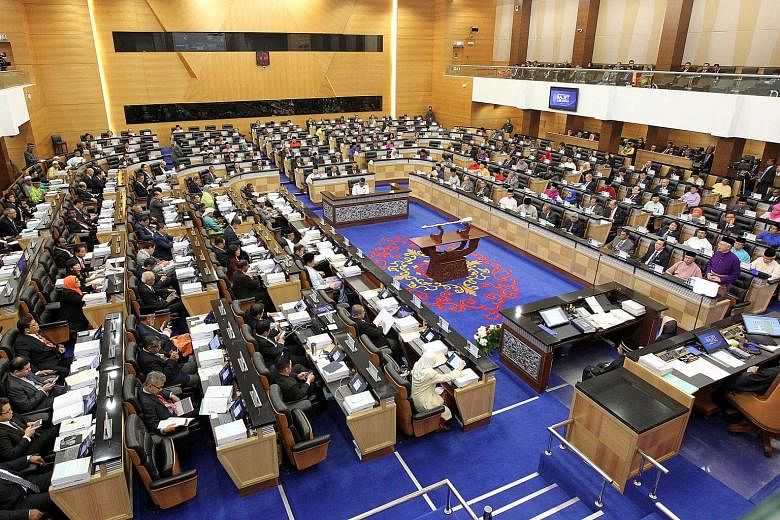KUALA LUMPUR • The tabling in the Malaysian Parliament yesterday of the Election Commission's (EC) redelineation report will affect 98 out of 165 parliamentary seats in Peninsular Malaysia.
The changes range from minor ones like a name change to the constituency to the huge movement of voters and the redrawing of the size of constituencies.
There are a total of 222 seats in the federal Parliament, after counting in 31 seats in Sarawak, 25 in Sabah, and one in Labuan island.
Only seats in Perlis and Putrajaya will not see any changes.
Johor, Selangor and Perak states are the most affected, with 19, 18 and 16 parliamentary seats respectively seeing changes of some kind.
These numbers are based on the electoral roll that was gazetted by the EC in May 2016.
The ruling Barisan Nasional (BN) coalition won 85 of the 165 seats to the opposition's 80 seats, out of the 165 in Peninsular Malaysia, in the 2013 general election.
If the new boundaries had been used in 2013, BN would have won 93 seats while the opposition would have taken 72 seats.
Analysts from electoral reform groups say Selangor will see the most significant changes and this could result in very close fights.
The opposition claims that the government has packed their supporters into larger constituencies, while moving Malay voters - seen to be pro-government - into other wards that BN could expect to win.
One example is a new Selangor parliamentary constituency called Sungai Buloh, which will see a reduction of voters from 128,000 when it was called Subang, to 73,000. According to opposition MP Ong Kian Ming, Sungai Buloh ward will have 64 per cent Malay voters, compared to 47 per cent under its old name.
Activist Wong Chin Huat, who studies electoral systems, said the average size of parliamentary seats won by BN in the 2013 general election was about 48,000 voters while it was 79,000 voters for the opposition.
In the Kota Melaka constituency in Melaka state, an extra 28,000 voters have been moved in from the nearby Hang Tuah Jaya seat.
The opposition Parti Keadilan Rakyat won the seat in 2013, but is expected to lose with the redrawn boundaries, analysts say.
They also say that with more Malay voters brought into the Lembah Pantai seat in Kuala Lumpur by the delineation, MP Nurul Izzah Anwar - the daughter of opposition chief Anwar Ibrahim - is expected to lose her seat unless she moves to another ward.
"Democracy is the process where voters choose politicians, but gerrymandering is the process of politicians choosing voters," declared Mr Wong.
But Tindak Malaysia mapping adviser Danesh Prakash Chacko said the new electoral boundaries do not automatically mean victory for BN in the coming election as voter preferences are changing all the time.
THE STAR/ASIA NEWS NETWORK


